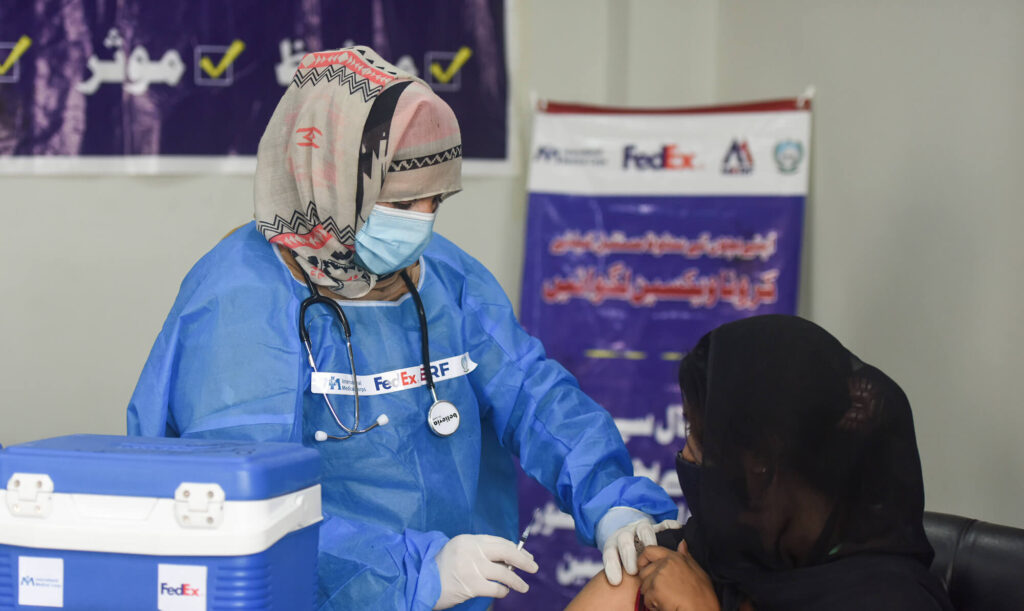On a cold morning in November, the stop after the Motorway Toll Plaza in Peshawar, Pakistan, was noisier than usual. Passengers departed buses in twos or threes, walking hurriedly to the COVID-19 vaccination camp.
Inside the camp, the calm, trained staff carried out the government-approved COVID-19 vaccination procedure. A patient approached a vaccinator—a man wearing blue personal protective equipment (PPE) and white gloves who wrote down the patient’s details, confirming which vaccine was due and how much. The vaccinator then measured the dose—transferring a clear liquid from a vial to a syringe—and inserted the needle into the patient’s bare arm. The patient flinched slightly, thanked the vaccinator and exited the camp. A health worker made notes in the register, then called the next patient in, and then the next. And so it went, from morning to night.
“Here at this camp, a great system is in place, and the process is very efficient and smooth,” says Hazrat Sher, the leader of the vaccination site, which is open from 8:00 a.m. to 8:00 p.m. six days a week, and provides access to vaccines for the public free of charge.
With support from FedEx and International Medical Corps, local implementing partner Medical Emergency Resilience Foundation (MERF) is vaccinating people against COVID-19 throughout Peshawar District. The site at Motorway Toll Plaza is one of two—the other is a community vaccination center in Peshawar city. In addition, 12 mobile vaccination teams travel to villages, schools, colleges and universities.
The camps and mobile teams are part of the government’s national vaccination campaign. Three months into the four-month campaign, more than 62,000 vaccine doses had been administered.
Campaign preparation
Before the campaign began, International Medical Corps worked with Pakistan’s Department of Health in Khyber Pakhtunkhwa province, and with Khyber Medical University in Peshawar, to conduct a vaccine hesitancy survey. The results indicated that the urban population was more hesitant than the rural population, and vaccine acceptance was much higher in men than women.
Our survey results also indicated that women need permission from the male head of their household to travel to a vaccination site. This is why we use mobile vaccination teams.
Due to cultural restrictions, women in Pakistan are less exposed to people outside their families—most awareness activities happen in community areas that women can’t access, such as mosques and markets—and, as a result, women have fewer sources of information.
“Many women, especially pregnant and lactating mothers, have false perceptions and believe rumors that they have heard,” says Raheela Inam, a community outreach worker with MERF. “Some say that the vaccine causes miscarriage and stillbirth, or decreases milk supply while breastfeeding, and some people even believe it causes infertility.”
To battle such misinformation, outreach workers hold COVID-19 vaccine awareness sessions in communities—explaining that the vaccine is safe and has no such side effects—and they share educational materials. In addition to community awareness sessions, outreach workers conduct sessions at universities, including Abasyn University.
Keys to a successful vaccination campaign
“To encourage young people to get vaccinated, we first coordinate with the administrative unit of the universities and brief them about the project and the importance of getting everyone vaccinated,” explains Noman Khan, District Field Officer at MERF. “Then, we schedule the days where we vaccinate people and conduct awareness sessions for the students.”
The approach is working. “I attended the awareness session here, organized by the university,” explains Abasyn University student Malik Sheraz Khan. “I was not vaccinated, so I am getting my first shot here today.”
These measures—community and university awareness sessions, educational materials, mobile teams, posters reassuring pregnant women about vaccine safety, and people encouraging their family, friends and neighbors to get vaccinated—are all helping to make this vaccination campaign a success.
“When I came to the university, I saw many posters and banners, and learned about the vaccination camp,” says Rameen Mazhar, a psychology student at Abasyn University. “I was very happy because my second dose was due, and it took no time to get fully vaccinated.”
“Earlier, people were afraid, but now people are more aware of the benefits of vaccination with the collaborative efforts of the government and the media, and our teams are also educating people,” says Farah, a vaccinator at the Motorway Toll Plaza vaccination camp. “And I can see the change.”
